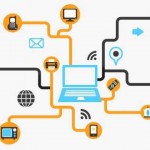THE FUTURE OF THINGS
January 23, 2015
 A couple of weeks ago, as I was walking into my local convenience store, I was approached by a street peddler. He wasn’t a typical peddler, selling home-made trinkets or flowers from a local garden. He was an employee of a major Chicago newspaper, and was trying to convince me to buy a subscription. It struck me how different things are now from my growing-up years. My family subscribed to multiple newspapers and magazines, when I was a child. Today, however, any information I could gain access to by purchasing a newspaper or magazine subscription can be easily found online for free, with no effort.
A couple of weeks ago, as I was walking into my local convenience store, I was approached by a street peddler. He wasn’t a typical peddler, selling home-made trinkets or flowers from a local garden. He was an employee of a major Chicago newspaper, and was trying to convince me to buy a subscription. It struck me how different things are now from my growing-up years. My family subscribed to multiple newspapers and magazines, when I was a child. Today, however, any information I could gain access to by purchasing a newspaper or magazine subscription can be easily found online for free, with no effort.
The Internet has brought some sweeping economic shifts, and we have seen the impact on the newspaper and print industries. Blogs and news sites have almost crippled newspapers and magazines. YouTube and Netflix are beginning to dethrone traditional television. Online courses and e-books are usurping traditional in-person courses and textbooks. Spotify, Pandora, and others are replacing CDs and traditional radio. Not only has the Internet ushered in a consumer-centric era, but it has also shown that consumers have a strong preference for a-la-carte offerings.more–>
Anybody who has been watching the expansion of the Internet is aware that consumers are taking the center-stage, and information-based business models are losing out to consumer-driven products. A keen observer would pay attention to what the Internet of Things is doing to expand this age of consumerism.
More and more sensors and smart devices are coming online each day. They stream data to massive data warehouses. Analytics software can be exposed via cloud-based offerings, offering summaries and implications of that data to any consumer for very low or zero cost. The implication of the Internet of Things is a do-it-yourself market prediction engine. Any individual with a product to sell will be able to analyze market trends, adapt to consumer behavior, create marketing strategies, build products, and even make deliveries with drones or self-driving cars, all from the comfort of his or her own home.
What all these mean is that the economic shift towards consumer focus will no longer be limited to information-based goods and services. Uber is one of the first examples of this expansion. Given all of its controversies, imagine what importance Uber will gain when self-driving cars become main-stream! How could a taxi service that has to pay for vehicles and drivers ever compete with one that only has vehicles?
Jeremy Rifkin, an economic theorist, recently delivered a speech on the economic implications of the Internet of Things for Google (view it on YouTube here). In it, he describes how the Internet of Things could bring about a new economic system, which he refers to as ‘collaborative commons.’ Rifkin’s thoughts on the subject should be taken as a call to action. The Internet of Things is not something to look at with passing interest; it has the potential to become an integral part of our everyday lives. The only way to stay ahead in a changing market is to be a paragon of that change.

 English | EN
English | EN 